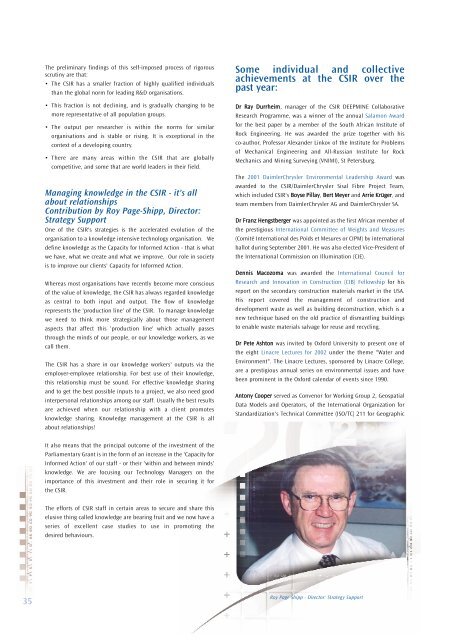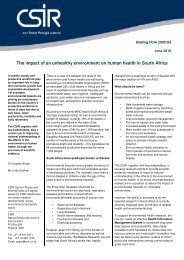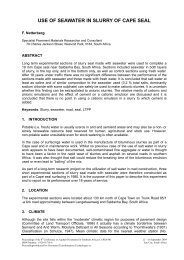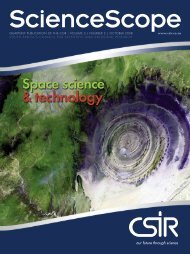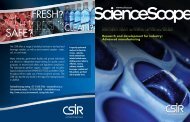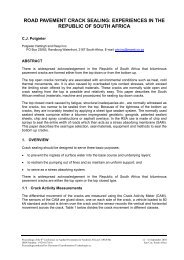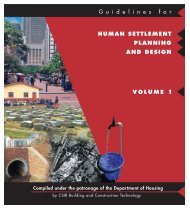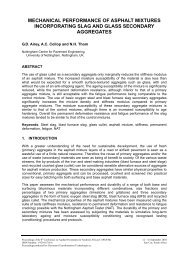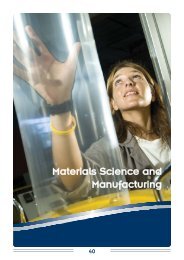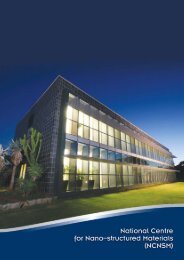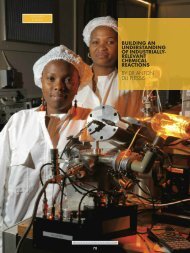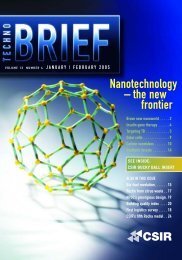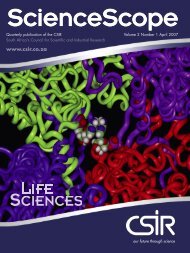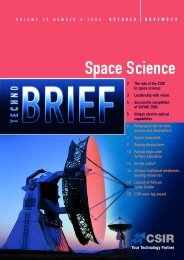CSIR Technology Impact 2002
CSIR Technology Impact 2002
CSIR Technology Impact 2002
You also want an ePaper? Increase the reach of your titles
YUMPU automatically turns print PDFs into web optimized ePapers that Google loves.
35<br />
The preliminary findings of this self-imposed process of rigorous<br />
scrutiny are that:<br />
The <strong>CSIR</strong> has a smaller fraction of highly qualified individuals<br />
than the global norm for leading R&D organisations.<br />
This fraction is not declining, and is gradually changing to be<br />
more representative of all population groups.<br />
The output per researcher is within the norms for similar<br />
organisations and is stable or rising. It is exceptional in the<br />
context of a developing country.<br />
There are many areas within the <strong>CSIR</strong> that are globally<br />
competitive, and some that are world leaders in their field.<br />
Managing knowledge in the <strong>CSIR</strong> - it's all<br />
about relationships<br />
Contribution by Roy Page-Shipp, Director:<br />
Strategy Support<br />
One of the <strong>CSIR</strong>'s strategies is the accelerated evolution of the<br />
organisation to a knowledge intensive technology organisation. We<br />
define knowledge as the Capacity for Informed Action - that is what<br />
we have, what we create and what we improve. Our role in society<br />
is to improve our clients' Capacity for Informed Action.<br />
Whereas most organisations have recently become more conscious<br />
of the value of knowledge, the <strong>CSIR</strong> has always regarded knowledge<br />
as central to both input and output. The flow of knowledge<br />
represents the 'production line' of the <strong>CSIR</strong>. To manage knowledge<br />
we need to think more strategically about those management<br />
aspects that affect this 'production line' which actually passes<br />
through the minds of our people, or our knowledge workers, as we<br />
call them.<br />
The <strong>CSIR</strong> has a share in our knowledge workers' outputs via the<br />
employer-employee relationship. For best use of their knowledge,<br />
this relationship must be sound. For effective knowledge sharing<br />
and to get the best possible inputs to a project, we also need good<br />
interpersonal relationships among our staff. Usually the best results<br />
are achieved when our relationship with a client promotes<br />
knowledge sharing. Knowledge management at the <strong>CSIR</strong> is all<br />
about relationships!<br />
It also means that the principal outcome of the investment of the<br />
Parliamentary Grant is in the form of an increase in the 'Capacity for<br />
Informed Action' of our staff - or their 'within and between minds'<br />
knowledge. We are focusing our <strong>Technology</strong> Managers on the<br />
importance of this investment and their role in securing it for<br />
the <strong>CSIR</strong>.<br />
The efforts of <strong>CSIR</strong> staff in certain areas to secure and share this<br />
elusive thing called knowledge are bearing fruit and we now have a<br />
series of excellent case studies to use in promoting the<br />
desired behaviours.<br />
Some individual and collective<br />
achievements at the <strong>CSIR</strong> over the<br />
past year:<br />
Dr Ray Durrheim, manager of the <strong>CSIR</strong> DEEPMINE Collaborative<br />
Research Programme, was a winner of the annual Salamon Award<br />
for the best paper by a member of the South African Institute of<br />
Rock Engineering. He was awarded the prize together with his<br />
co-author, Professor Alexander Linkov of the Institute for Problems<br />
of Mechanical Engineering and All-Russian Institute for Rock<br />
Mechanics and Mining Surveying (VNIMI), St Petersburg.<br />
The 2001 DaimlerChrysler Environmental Leadership Award was<br />
awarded to the <strong>CSIR</strong>/DaimlerChrysler Sisal Fibre Project Team,<br />
which included <strong>CSIR</strong>'s Boyse Pillay, Bert Meyer and Arrie Krüger, and<br />
team members from DaimlerChrysler AG and DaimlerChrysler SA.<br />
Dr Franz Hengstberger was appointed as the first African member of<br />
the prestigious International Committee of Weights and Measures<br />
(Comité International des Poids et Mesures or CIPM) by international<br />
ballot during September 2001. He was also elected Vice-President of<br />
the International Commission on Illumination (CIE).<br />
Dennis Macozoma was awarded the International Council for<br />
Research and Innovation in Construction (CIB) Fellowship for his<br />
report on the secondary construction materials market in the USA.<br />
His report covered the management of construction and<br />
development waste as well as building deconstruction, which is a<br />
new technique based on the old practice of dismantling buildings<br />
to enable waste materials salvage for reuse and recycling.<br />
Dr Pete Ashton was invited by Oxford University to present one of<br />
the eight Linacre Lectures for <strong>2002</strong> under the theme "Water and<br />
Environment". The Linacre Lectures, sponsored by Linacre College,<br />
are a prestigious annual series on environmental issues and have<br />
been prominent in the Oxford calendar of events since 1990.<br />
Antony Cooper served as Convenor for Working Group 2, Geospatial<br />
Data Models and Operators, of the International Organization for<br />
Standardization's Technical Committee (ISO/TC) 211 for Geographic<br />
Roy Page-Shipp - Director: Strategy Support


